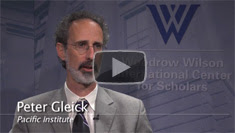
“The advantage of the idea of peak water is that it lets us think differently about the limits that face us,” said MacArthur “Genius” Fellow and
Pacific Institute President
Peter Gleick in this short interview with
ECSP. Gleick, who launched the latest edition of
The World’s Water at the
Wilson Center last week, has been talking about peak water since 2009 when he and Pacific Institute colleague
Meena Palaniappan first
wrote about the concept in that year’s water report (see our
interview from then too).
Renewable vs. Non-Renewable
Peak water is “the idea that we are effectively running into constraints and limits on our water use,” said Gleick, in part because of population growth. “It lets us think differently about the limits to the water that’s available for us to use, and about the water that it’s appropriate for us to use, and about the policies to put in place to avoid the bad things that happen when we reach or exceed peak constraints.”
Gleick breaks the concept into three categories:
“Without a Doubt We Are Exceeding Limits”
Across all three categories, said Gleick, we are very bad at understanding limits. “We don’t measure peak water carefully, we don’t collect the data necessary to understand when we’re approaching or exceeding peak water limits.”
“But without a doubt we are exceeding peak water limits in more and more regions of the world,” he said. “And that’s going to have implications for our economies. It’s going to have implications for our environment.”
“Understanding and applying the idea of peak water is the first step toward developing strategies and institutions to avoid the worst disasters associated with overuse and inappropriate use of our water resources.”
 “The advantage of the idea of peak water is that it lets us think differently about the limits that face us,” said MacArthur “Genius” Fellow and Pacific Institute President Peter Gleick in this short interview with ECSP. Gleick, who launched the latest edition of The World’s Water at the Wilson Center last week, has been talking about peak water since 2009 when he and Pacific Institute colleague Meena Palaniappan first wrote about the concept in that year’s water report (see our interview from then too).
“The advantage of the idea of peak water is that it lets us think differently about the limits that face us,” said MacArthur “Genius” Fellow and Pacific Institute President Peter Gleick in this short interview with ECSP. Gleick, who launched the latest edition of The World’s Water at the Wilson Center last week, has been talking about peak water since 2009 when he and Pacific Institute colleague Meena Palaniappan first wrote about the concept in that year’s water report (see our interview from then too). A Publication of the Stimson Center.
A Publication of the Stimson Center.




